North Carolina General Assembly of 1862–1864
The North Carolina General Assembly of 1862–1864 met in Raleigh from November 17, 1862 to December 22, 1862. Extra sessions were held on January 19, 1863–February 12, 1863; June 30, 1863–July 7, 1863; November 23, 1863–December 14, 1863; and May 17–30 1864 . The assembly consisted of the 120 members of the North Carolina House of Commons from 82 counties and 50 senators representing one or more counties in North Carolina Senate elected by the voters in October 1862. Zebulon Baird Vance was Governor of North Carolina during this assembly. This assembly met during the American Civil War as part of the Confederate States of America. Much of the legislation passed by this assembly dealt with the managing the state and its population during wartime.[1][2][3][4][5]
| 74th North Carolina General Assembly (1862–1864) | |||||||||||
|---|---|---|---|---|---|---|---|---|---|---|---|
| |||||||||||
| Overview | |||||||||||
| Legislative body | North Carolina General Assembly | ||||||||||
| Jurisdiction | North Carolina, Confederate States of America | ||||||||||
| Meeting place | Raleigh | ||||||||||
| Term | 1862–1864 | ||||||||||
| Senate | |||||||||||
| Members | 50 Senators | ||||||||||
| Speaker | Giles Mebane | ||||||||||
| Clerk | Charles R. Thomas | ||||||||||
| Assistant Clerk | L. C. Edwards | ||||||||||
| Doorkeeper | William J. Page | ||||||||||
| Assistant Doorkeeper | C. C. Tally | ||||||||||
| Party control | Confederate Party | ||||||||||
| House of Commons | |||||||||||
| Members | 120 Delegates | ||||||||||
| Speaker | Robert B. Gilliam[note 1], Richard Spaight Donnell, Marmaduke Swain Robins[note 2] | ||||||||||
| Speaker protem | William E. Mann[note 3] | ||||||||||
| Clerk | Henry E. Colton | ||||||||||
| Party control | Confederate Party | ||||||||||
| Sessions | |||||||||||
| |||||||||||
Assembly membership
House of Commons members
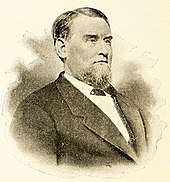
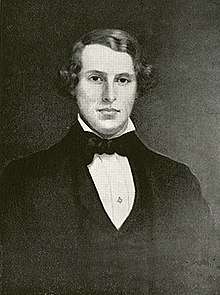
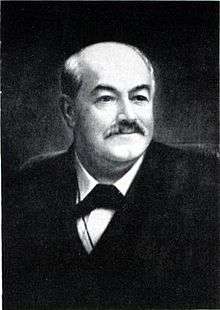
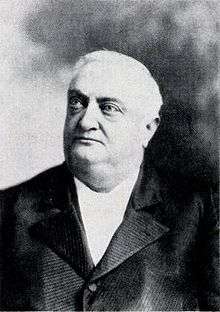
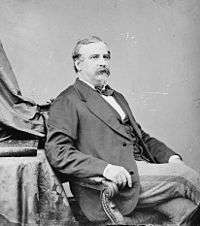
.jpg)
There were 82 counties with 120 delegates, 5 counties with three delegates, 28 counties with two delegates, and 49 counties with one delegate. The House of Commons delegates elected a Speaker (Richard Spaight Donnell, Robert B. Gilliam[note 1], Marmaduke Swain Robins[note 2], William E. Mann[note 3]), Clerk, Assistant Clerk, Doorkeeper, and Assistant Doorkeeper. The following delegates to the House of Commons were elected by the voters of North Carolina to represent each county and district:[2][3][4][6]
| County | Delegates per County | Delegate |
|---|---|---|
| Alamance | 2 | Rufus Yancey McAden[7] |
| Alamance | 2 | E. F. Watson |
| Alexander | 1 | John M. Carson |
| Anson | 2 | R. H. Burns |
| Anson | 2 | Purdie Richardson |
| Ashe | 1 | James M. Gentry |
| Beaufort | 2 | Richard Spaight Donnell |
| Beaufort | 2 | David Miller Carter[8] |
| Bertie | 2 | Peyton T. Henry |
| Bertie | 2 | James Bond |
| Bladen | 1 | J.W. Russ |
| Brunswick | 1 | Daniel Lindsay Russell, Jr. |
| Buncombe | 1 | John Burgin |
| Burke | 1 | John Parks |
| Cabarrus | 1 | William S. Harris |
| Caldwell | 1 | Matthias A. Bernhardt |
| Camden | 1 | John Forbes |
| Carteret | 1 | Unknown/Vacant |
| Caswell | 2 | Samuel S. Harrison |
| Caswell | 2 | William Long |
| Catawba | 1 | George S. Hooper[note 4] |
| Catawba | 1 | Horace L. Robards[note 4] |
| Catawba | 1 | W .P. Reinhardt[note 4] |
| Chatham | 3 | Thomas B. Harris |
| Chatham | 3 | William J. Headen |
| Chatham | 3 | Maurice Q. Waddell |
| Cherokee | 1 | James H. Bryson[note 5] |
| Cherokee | 1 | John W. Fentress[note 5] |
| Chowan | 1 | Lemuel C. Benbury |
| Cleveland | 2 | John R. Logan |
| Cleveland | 2 | David Beam |
| Columbus | 1 | William M. Baldwin[note 6] |
| Craven | 2 | J. B. J. Barrow[note 7] |
| Craven | 2 | Thomas H. Gaskins[note 7] |
| Craven | 2 | Richard A. Russell |
| Cumberland | 3 | John McCormick |
| Cumberland | 3 | Neill McKay |
| Cumberland | 3 | Jesse G. Shepherd |
| Currituck | 1 | Burwell M. Baxter |
| Davidson | 2 | Robert L. Beall |
| Davidson | 2 | Henry Walser |
| Davie | 1 | Henry B. Howard |
| Duplin | 2 | John D. Stanford |
| Duplin | 2 | L. W. Hodges |
| Edgecombe | 2 | Robert Bynum |
| Edgecombe | 2 | David Cobb |
| Forsyth | 2 | E. Kerner |
| Forsyth | 2 | John P. Nissen |
| Franklin | 1 | A. W. Pearce |
| Gaston | 1 | A. W. Davenport |
| Gates | 1 | William H. Manning |
| Granville | 3 | Robert B. Gilliam[note 1] |
| Granville | 3 | James S. Amis |
| Granville | 3 | Eugene Grissom |
| Greene | 1 | Henry H. Best |
| Guilford | 3 | R. W. Glenn |
| Guilford | 3 | M.S. Sherwood |
| Guilford | 3 | William R. Smith |
| Halifax | 2 | Archibald H. Davis |
| Halifax | 2 | Henry Joyner |
| Haywood | 1 | Samuel L. Love |
| Henderson | 1 | Alexander Henry |
| Hertford | 1 | John A. Vann |
| Hyde | 1 | Edward L. Mann |
| Iredell | 2 | Thomas A. Allison |
| Iredell | 2 | John Young |
| Jackson | 1 | Joseph Keener |
| Johnston | 2 | W. H. Avera |
| Johnston | 2 | Seth Woodall |
| Jones | 1 | Anthony E. Rhodes |
| Lenoir | 1 | William W. Dunn |
| Lincoln | 1 | Ambrose White |
| Macon | 1 | J. M. Lyle |
| Madison | 1 | Jesse Wallen |
| Martin | 1 | James Robinson |
| McDowell | 1 | William F. Craig |
| Mecklenburg | 2 | John L. Brown |
| Mecklenburg | 2 | E. C. Grier |
| Montgomery | 1 | Edmund G.L. Barringer |
| Moore | 1 | Alexander Kelly |
| Nash | 1 | Henry G. Williams |
| New Hanover | 2 | Samuel J. Person |
| New Hanover | 2 | John R. Hawes |
| Northampton | 2 | Williamn W. Peebles |
| Northampton | 2 | Samuel T. Stancil |
| Onslow | 1 | James H. Foy |
| Orange | 2 | William N. Patterson |
| Orange | 2 | John Berry[9] |
| Pasquotank | 1 | William E. Mann[note 3] |
| Perquimans | 1 | James H. Riddick |
| Person | 1 | M. D. C. Bumpass |
| Pitt | 2 | Burton J. Albritton |
| Pitt | 2 | Churchill Perkins |
| Randolph | 2 | Jonathan Worth[note 8] |
| Randolph | 2 | Isaac H. Foust[note 8] |
| Randolph | 2 | Marmaduke Swain Robins[note 2] |
| Richmond | 1 | Sanders M. Ingram |
| Robeson | 2 | Neill McNeill |
| Robeson | 2 | Murdock McRae |
| Rockingham | 2 | W. J. Gilliam |
| Rockingham | 2 | James I. Reynolds |
| Rowan | 2 | Nathan Neely Fleming[note 9] |
| Rowan | 2 | Francis Edwin Shober |
| Rutherford | 2 | A. R. Bryan |
| Rutherford | 2 | J. B. Carpenter |
| Sampson | 2 | William Kirby |
| Sampson | 2 | D. A. Bizzell[note 10] |
| Sampson | 2 | Thomas H. Powell[note 10] |
| Stanly | 1 | Lafayette Green |
| Stokes | 1 | William H. Flynt |
| Surry | 1 | Joseph Hollingsworth |
| Tyrrell | 1 | Eli Spruill |
| Union | 1 | Cyrus Q. Lemmond |
| Wake | 3 | J.H. Alford |
| Wake | 3 | William Laws |
| Wake | 3 | Daniel Gould Fowle[note 11] |
| Wake | 3 | Calvin J. Rogers[note 11] |
| Warren | 2 | L. Henderson |
| Warren | 2 | Thomas J. Judkins |
| Washington | 1 | James H. Smith[note 12] |
| Watauga | 1 | William Horton |
| Wayne | 2 | Marcus K. Crawford |
| Wayne | 2 | B.B. Rives |
| Wilkes | 2 | W.W. Hampton |
| Wilkes | 2 | E.M. Welborn |
| Yadkin | 1 | Andrew C. Cowles |
| Yancey | 1 | D.M. Young |
Senate members
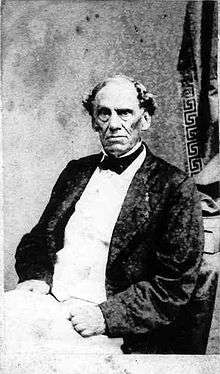
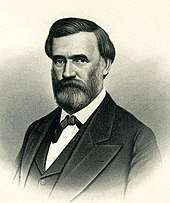
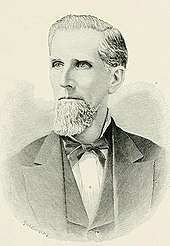
The Senators elected a President, Clerk, Assistant Clerk, Doorkeeper, and Assistant Doorkeeper. The following Senators were elected by the voters of North Carolina to represent each county:[2][3][4][10]
| District | Counties | Senator | Home County |
|---|---|---|---|
| 1 | Pasquotank & Perquimans | William H. Bagley | Perquimans |
| 2 | Camden & Currituck | D. McD. Lindsay | Camden |
| 3 | Chowan & Gates | Mills H. Eure | Gates |
| 4 | Hyde & Tyrrell | Charles McCleese | Tyrrell |
| 5 | Northampton | W.S. Copeland | Northampton |
| 6 | Hertford | Joseph B. Slaughter | Hertford |
| 7 | Bertie | Thomas M. Garrett | Bertie |
| 8 | Martin & Washington | James G. Galloway | Washington |
| 9 | Halifax | M.L. Wiggins | Halifax |
| 10 | Edgecombe | Jesse H. Powell | Edgecombe |
| 11 | Pitt | Elias J. Blount | Pitt |
| 12 | Beaufort | Edward J. Warren | Beaufort |
| 13 | Craven | William B. Wadsworth | Craven |
| 14 | Carteret & Jones | M.F. Arendell | Carteret |
| 15 | Greene & Lenoir | Edward Patrick | Lenoir |
| 16 | New Hanover | Eli W. Hall | New Hanover |
| 17 | Duplin | James Dickson | Duplin |
| 18 | Onslow | A.J. Murrell | Onslow |
| 19 | Bladen, Brunswick, & Columbus | John W. Ellis | Columbus |
| 20 | Cumberland | W.B. Wright | Cumberland |
| 21 | Sampson | Thomas I. Faison | Sampson |
| 22 | Wayne | William K. Lane[note 13] | Wayne |
| 22 | Wayne | Benjamin Aycock[note 13] | Wayne |
| 23 | Johnston | C.B. Sanders | Johnston |
| 24 | Wake | John P.H. Russ | Wake |
| 25 | Nash | A.G. Taylor | Nash |
| 26 | Franklin | Washington Harris | Franklin |
| 27 | Warren | E. D. Drake[note 14] | Warren |
| 27 | Warren | Thomas J. Pritchard[note 14] | Warren |
| 28 | Granville | R.W. Lassiter | Granville |
| 29 | Person | James Holeman | Person |
| 30 | Orange | William A. Graham | Orange |
| 31 | Alamance & Randolph | Giles Mebane | Alamance |
| 32 | Chatham | William P. Taylor | Chatham |
| 33 | Montgomery & Moore | Calvin W. Wooley | Montgomery |
| 34 | Richmond, & Robeson | Giles Leitch | Robeson |
| 35 | Anson & Union | William C. Smith | Anson |
| 36 | Guilford | Peter Adams | Guilford |
| 37 | Caswell | Bedford Brown | Caswell |
| 38 | Rockingham | Francis L. Simpson | Rockingham |
| 39 | Mecklenburg | John A. Young | Mecklenburg |
| 40 | Cabarrus & Stanly | J.W. Smith | Stanly |
| 41 | Davie & Rowan | James Graham Ramsay | Rowan |
| 42 | Davidson | H. Adams | Davidson |
| 43 | Forsyth & Stokes | James E. Matthews | Stokes |
| 44 | Ashe, Surry, Watauga, & Yadkin | Isaac Jarratt | Ashe |
| 45 | Alexander, Iredell, Wilkes | Leander Q. Sharpe | Iredell |
| 46 | Burke, Caldwell, & McDowell | Samuel J. Neal | Burke |
| 47 | Catawba, Gaston, & Lincoln | James White | Lincoln |
| 48 | Cleveland & Rutherford | M.O. Dickson | Rutherford |
| 49 | Buncombe, Henderson, Madison, & Yancey | William Marcus Shipp[11] | Buncombe |
| 50 | Cherokee, Haywood, Jackson, & Macon | C.D. Smith | Macon |
Legislation
The Civil War was ongoing during the entire term of this assembly. The assembly passed public laws dealing with the following: the destroyed court house in Hertford County, funding of the state insane asylum (Dorothea Dix Hospital), establishing the eighth judicial district, prohibiting the distillation of spirituous liquors, modifying acts so that justices of the peace absent from counties under occupation of Union Troops would not loose their position, acts dealing with the state militia, purchase and hiding of emergency provisions, authorization to the governor for the use of slave labor for building fortifications, provisions to survivors of soldiers dying in service, resolution to declare the separation of the United States and Confederate State final, creating a Roll of Honor maintained by the Governor of Confederate soldiers and patriots from North Carolina, a resolution condemning the confiscation of North Carolina government iron by the Confederate Government, extending the statute of limitations till the war is over, allowing the governor to draft all able bodied men between 18 and 45 years old into the militia, making monopolies, extortions, and speculation illegal during the war, and raising wartime taxes. The senate and house occasionally went into secret sessions, according to the minutes. This General assembly create the Office of the North Carolina State Auditor, who was initially elected by the legislature every two years. Samuel F. Phillips was elected by this legislature as the first auditor. For details about legislation and minutes of this assembly, see Legislative Documents.[12][13]
Notes
- Robert B. Gilliam was elevated to the State Superior Court bench in 1863 and Richard Spaight Donnell was elected to replace him as Speaker of the House of Commons.
- Marmaduke Swain Robins was elected on November 24, 1863 when illness kept Richard Spaight Donnell from that session. See Cheney, page 356, footnote 580.
- William E. Mann served for a brief period as Speaker in the January adjourned session when Richard Donnell was ill.
- At some point George S. Hooper resigned and Horace L. Robards replaced him. W. P. Reinhardt attended the last special session. Robards may have joined the Confederate Army
- James H. Bryson resigned his seat at some point. John W. Fentress was elected to replace him for the third session.
- William M. Baldwin resigned his seat. No known replacement.
- J. B. J. Barrow died before taking office and was replaced by Thomas H. Gaskins in the second special session.
- Jonathan Worth resigned his position in the house after being elected as North Carolina State Treasurer. He was replaced by Isaac H. Foust.
- Nathan Neely Fleming was killed at the Battle of the Wilderness (May 5–7, 1964).
- D. A. Bizzell died in office and Thomas H. Powell was elected to replace him in the second session.
- Daniel G. Fowle resigned his seat after being elected as Adjutant General of North Carolina. He was replaced by Calvin J. Rogers in the second special session.
- James H. Smith did not take his seat until the first special session.
- William K. Lane resigned and Benjamin Aycock took his place in the Extra Session in 1863.
- E. D. Drake died in office and was replaced by Thomas J. Pritchard in the extra session in 1863.
References
- Norris, David A. (2006). "North Carolina Capitals, Colonial and State". NCPedia.org. Retrieved September 4, 2019.
- Connor, Robert Diggs Wimberly, ed. (1913). A Manual of North Carolina (PDF). Raleigh, North Carolina: E. M. Uzzell & Company. Retrieved April 27, 2019.
- Wheeler, John Hill, ed. (1874). The Legislative Manual and Political Register of the State of North Carolina for the Year 1874. Raleigh, North Carolina: Josiah Turner, Jr.; State Printer and Binder. Retrieved April 9, 2019.
- Cheney, John L. Jr. (1974). North Carolina Government, 1585–1974. pp. 328-330.
- "North Carolina Constitution of 1776". Yale Law School. 1776. Retrieved September 4, 2019.
- Lewis, J.D. "North Carolina State House of Commons 1862-1863". The American Revolution in North Carolina. Retrieved April 17, 2019.
- Alexander, Roberta Sue (1991). "Rufus Yancey McAden". NCPEDIA. Retrieved November 30, 2019.
- Wallace, Carolyn A. (1979). "David Miller Carter". NCPEDIA. Retrieved November 29, 2019.
- Engstrom, Mary Claire (1979). "John Berry". NCPEDIA. Retrieved November 30, 2019.
- Lewis, J.D. "North Carolina State Senate 1862-1863". The American Revolution in North Carolina. Retrieved April 17, 2019.
- Macfie, John (1994). "William Marcus Shipp". NCpedia.
- Johnson, K. Todd (2006). "State Auditor". NCPEDIA. Retrieved November 29, 2019.
- "Public Laws of the State of North Carolina Passed by the General Assembly of 1862-1863" (PDF). Carolana.com. 1863.